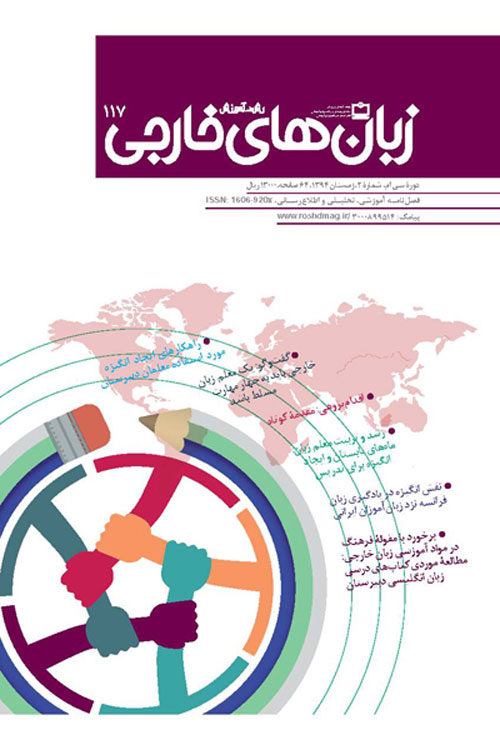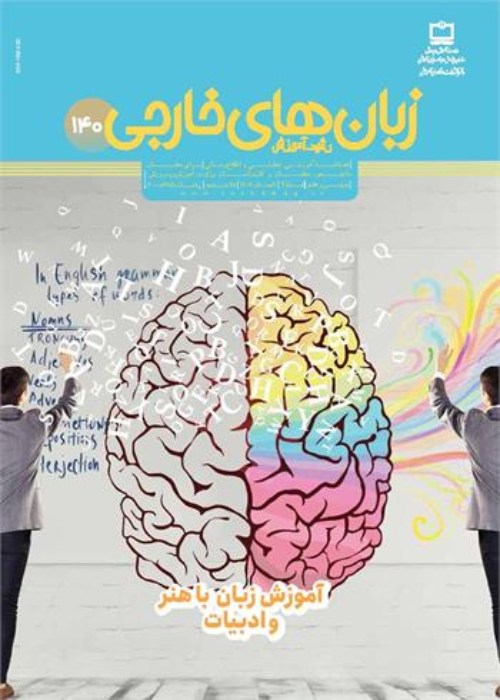فهرست مطالب

نشریه رشد آموزش زبان های خارجی
پیاپی 117 (زمستان 1394)
- تاریخ انتشار: 1394/10/30
- تعداد عناوین: 11
- یادداشت سردبیر
- گفت و گو
-
یک معلم زبان خارجی باید به چهار مهارت مسلط باشد / پای صحبت حمید نامدار تیموریصفحه 4
- اخبار کتاب های درسی
-
تکمیل کتاب های درسی زبان انگلیسی دوره اول متوسطه / اخبار کتاب های درسیصفحه 9
- نقد و نظر
-
Page 24
This article provides a brief introduction to the concept of action research, as a new genre of educational inquiry. The paper begins with a short history of action research, situating the development of action research in mainstream education, and more particularly in the Iranian ELT context. The article proceeds with a general definition of action research and a distinction between the two general conceptions of action research presented in the literature. Then, it turns to present a general framework for conducting action research. It is hoped that this brief introduction will serve as an initiative aimed at promoting this form of research among Iranian language teachers.
Keywords: action, action research, planning, observation, reflection -
Page 33
-
Page 47
Many scholars today believe that culture and language are inseparable and culture learning must be an integral part of language learning. Thus, the present article is to give an account of the important place that culture holds in foreign and second language education. Further, it investigates the way culture is dealt with in ELT in Iran in general and the place of culture in ELT textbooks at the high school level in particular. Throughout the study, this issue was examined with reference to the relevant theoretical background, and the content analysis results of previous textbook evaluation studies carried out in the Iranian context. The research findings make it clear that the current ELT textbooks in Iran appear to be short of the goal of broadening students’ cultural understanding. Hence, changes should be made in the textbooks if students are to be prepared to communicate in the multicultural world of English. Finally, some practical suggestions concerning integrating culture into second language curriculum will be presented. Findings of this study may offer insights for those involved in educational administration, syllabus design, curriculum planning, and materials development.
Keywords: language- culture relationship, textbooks, culture, ELT in Iran, Integration of culture -
Page 55
Motivation is regarded to be one of the crucial factors that leads to success in L2 learning. L2 motivation has been the focus of research for a considerable period of time and sophisticated models have been developed. However, relatively few studies have investigated how and to what extent L2 learners’ motivation can be increased by EFL teachers in the classroom. In the present study 50 EFL teachers completed a 48-item questionnaire designed by Cheng and Dörnyei (2007). The findings revealed that EFL teachers in Iran favored strategies that are mostly related to teachers proper behavior in the classroom. The results of the present study have the potential to inform and make EFL teachers more aware of the variety of effective motivational practices which aid and encourage students to achieve the intended learning and performance in the target language.
Keywords: motivation, motivational strategies, EFL teachers -
Page 64
Pratiquer un enseignement efficace et motivant et accéder à une propre acquisition est le désir de tous les enseignants et les apprenants de la langue étrangère. La motivation est un facteur essential dans le développement des saviors et des savoir –faire langagiers d’une langue seconde ou étrangère. Elle peut constituer aussi quelques-uns des paramèters les plus importants dans le processus de l’appropriation de la langue sur lesquels reposent certains enjeux cognitifs chez les apprenants, comme la mise en œuvre des strategies d’apprentissage et l’intégration de nouvelles strategies. Cet article a l’intention d’aider les enseignants et les apprenants iraniens afin de trouver les stratégies et les méthodes utiles pour rendre le processus d’enseignement/apprentissage plus agréable. Elle vise à mettre l’accent sur la majorité des facteurs qui participent à la formation de la motivation chez les apprenants iraniens mais aussi sur les facteurs principaux qui interviennent dans l’appropriation d’une langue étrangère. Dans cet article oncherche à montrer comment la motivation participe-t-elle dans l’appropriation de la langue française. De plus, on cherche à examiner, comment les méthodes basées sur l’approche actionnelle et communicative (Alter égo et Reflets) participent à la formation de la motivation dans le processus d’appropriation de la langue française.
Keywords: la motivation, l’appropriation de la langue française, enseignement, apprentissage, langueétrangère, l’enseignant, l’apprenant


